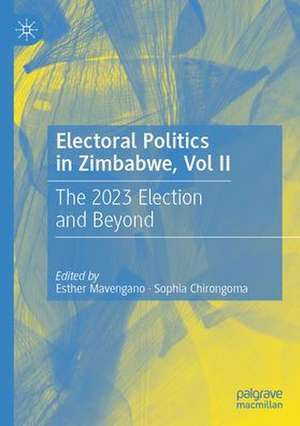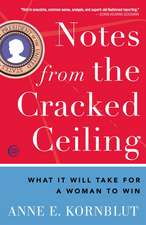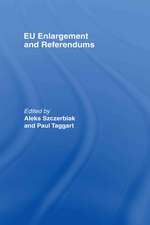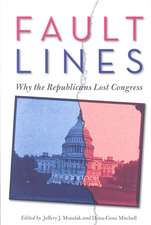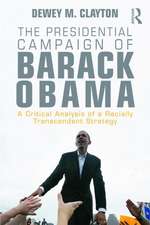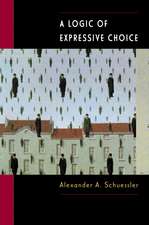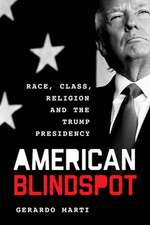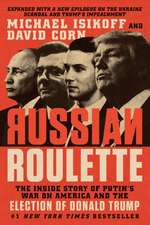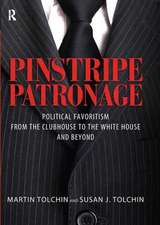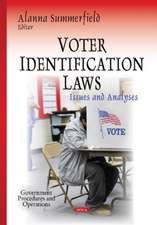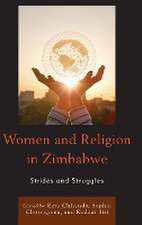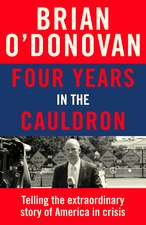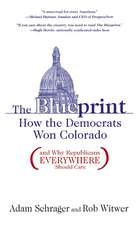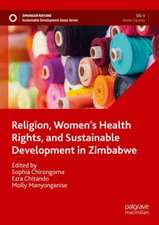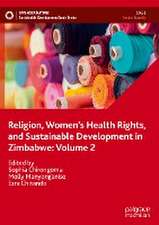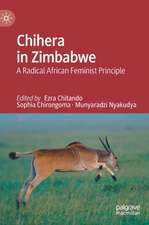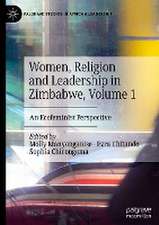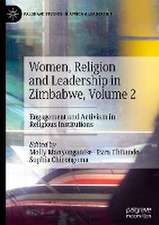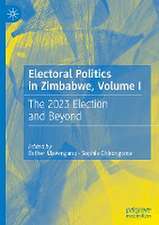Electoral Politics in Zimbabwe, Vol II: The 2023 Election and Beyond
Editat de Esther Mavengano, Sophia Chirongomaen Limba Engleză Hardback – 9 aug 2023
Preț: 899.87 lei
Preț vechi: 1097.41 lei
-18% Nou
Puncte Express: 1350
Preț estimativ în valută:
172.19€ • 180.24$ • 143.32£
172.19€ • 180.24$ • 143.32£
Carte tipărită la comandă
Livrare economică 31 martie-14 aprilie
Preluare comenzi: 021 569.72.76
Specificații
ISBN-13: 9783031337956
ISBN-10: 3031337956
Ilustrații: XXV, 433 p. 11 illus., 8 illus. in color.
Dimensiuni: 148 x 210 mm
Greutate: 0.7 kg
Ediția:1st ed. 2023
Editura: Springer Nature Switzerland
Colecția Palgrave Macmillan
Locul publicării:Cham, Switzerland
ISBN-10: 3031337956
Ilustrații: XXV, 433 p. 11 illus., 8 illus. in color.
Dimensiuni: 148 x 210 mm
Greutate: 0.7 kg
Ediția:1st ed. 2023
Editura: Springer Nature Switzerland
Colecția Palgrave Macmillan
Locul publicării:Cham, Switzerland
Cuprins
Chapter 1. Introduction: The Nexus Between Gender, Religion and the Media in Zimbabwean Electoral politics.- Section A: Gender and electoral politics in Zimbabwe. Chapter 2. Electoral Participation as a fundamental right for women with disabilities in Zimbabwe.- Chapter 3. Unpacking the issue of gender and electoral violence in Christopher Mlalazi’s They Are Coming.- Chapter 4. Shona Women and Grassroots Politics in Zimbabwe: Prospects for the 2023 General Elections.- Chapter 5. Critical thinking, Gender and Electoral politics in Zimbabwe.- Chapter 6. Of pains, regrets and suppressed desires: Gendered Politics and Women Activism in Zimbabwean Electoral Politics.- Chapter 7. Rhetoric or reality? Assessing the efficacy of Policy and legislative interventions in enhancing women political participation in Zimbabwe.- Chapter 8.Post-independence election violence: Re-thinking the marginalisation of Women in Zimbabwean politics.- Chapter 9. Voter Rights and Gender: An Analysis of theImportance of Voter Education in Zimbabwe. Section B: Media and electoral politics in Zimbabwe. Chapter 10. Pollytricking or political contestation? The digital space as alternative public sphere in the run up to the 2023 public election in Zimbabwe.- Chapter 11. Zimbabwean Press and electoral violence: a framing analysis of the March 2022 by-elections.- Chapter 12. Melancholia and polysemanticism in Winky D’s sonic retentions: Subverting expressive barricades and voicing the electoral process through performance.- Chapter 13. The morbidity of Zimbabwe’s transformational politics: Hope or doom in the post-coup era?.- Chapter 14. The rhetoric of Onoma and the intersection of memory and power dynamics in naming and name-calling in Zimbabwe’s electoral politics.- Chapter 15. The Effectiveness of social media in mitigating unfair Mainstream media electoral coverage in Zimbabwe.- Section C: Traditional Leaders and electoral politics in Zimbabwe. Chapter 16. Traditional leadersas vote brokers and king makers in Zimbabwe’s Elections.- Chapter 17.The institution of Traditional leadership and partisan politics in Zimbabwe.- Chapter 18. The Role of Traditional Leaders and Culture in Zimbabwean Elections.- Chapter 19. A critique of the responsibility of traditional leaders in the electoral process: A Zimbabwean experience.- Chapter 20. Abusing the traditional sceptre: Chiefs and electoral collusion in Zimbabwe.- Chapter 21. Traditional Leaders, Electoral Politics and Impregnability of the Rural Constituency in Zimbabwe.
Notă biografică
Esther Mavengano is Lecturer in the Faculty of Arts at Great Zimbabwe University in Masvingo, Zimbabwe. She is also Research Fellow at the Research Institute for Theology and Religion, UNISA, South Africa, and Alexander von Humboldt Postdoctoral Research Fellow at the Institute of English and American Studies, Technischen Universität Dresden, Germany.
Sophia Chirongoma is Senior Lecturer in the Religious Studies Department at Midlands State University, Zimbabwe. She is also Academic Associate/Research Fellow at the Research Institute for Theology and Religion at the University of South Africa.
Sophia Chirongoma is Senior Lecturer in the Religious Studies Department at Midlands State University, Zimbabwe. She is also Academic Associate/Research Fellow at the Research Institute for Theology and Religion at the University of South Africa.
Textul de pe ultima copertă
"If Zimbabwe won political independence in 1980 and reclaimed land in 2000, it is yet to win democracy. Elections in Zimbabwe remain not only a site of violence, but participation of women is limited too. Media is instrumentalised just as traditional leaders are patronised for political ends. This collection of well-researched essays on the subject of elections is most welcomed and makes an indispensable addition to the understanding of problematic political culture in Zimbabwe."
–Sabelo J. Ndlovu-Gatsheni, Professor/Chair of Epistemologies of the Global South & Vice-Dean for Research of the Africa Multiple Cluster of Excellence, University of Bayreuth, Germany.
Volume two of Electoral Politics in Zimbabwe: The 2023 Election and Beyond argues that research into Zimbabwe’s politics is multifaceted and topical, particularly because for more than two decades now, this Southern African state has been dogged by multiple problemsincluding hyperinflation, drought, escalating poverty levels, extremely high unemployment rates and political instabilities. The volume’s overall goal is to ignite intellectual discussions and practical action towards turning the political wheels that have been in place for decades. The first segment examines the interface between gender and electoral politics in Zimbabwe. The second part discusses the role of the media in Zimbabwe’s electoral politics. The third section reflects on the role of traditional leaders and religious discourses in Zimbabwe’s electoral politics. The book will be a key resource to colleges, universities and organisations in Zimbabwe, the Southern Africa region and even beyond.
Esther Mavengano is Lecturer in the Faculty of Arts at Great Zimbabwe University in Masvingo, Zimbabwe. She is also Research Fellow at the Research Institute for Theology and Religion, UNISA, South Africa, and Alexandervon Humboldt Postdoctoral Research Fellow at the Institute of English and American Studies, Technischen Universität Dresden, Germany.
Sophia Chirongoma is Senior Lecturer in the Religious Studies Department at Midlands State University, Zimbabwe. She is also Academic Associate/Research Fellow at the Research Institute for Theology and Religion at the University of South Africa.
–Sabelo J. Ndlovu-Gatsheni, Professor/Chair of Epistemologies of the Global South & Vice-Dean for Research of the Africa Multiple Cluster of Excellence, University of Bayreuth, Germany.
Volume two of Electoral Politics in Zimbabwe: The 2023 Election and Beyond argues that research into Zimbabwe’s politics is multifaceted and topical, particularly because for more than two decades now, this Southern African state has been dogged by multiple problemsincluding hyperinflation, drought, escalating poverty levels, extremely high unemployment rates and political instabilities. The volume’s overall goal is to ignite intellectual discussions and practical action towards turning the political wheels that have been in place for decades. The first segment examines the interface between gender and electoral politics in Zimbabwe. The second part discusses the role of the media in Zimbabwe’s electoral politics. The third section reflects on the role of traditional leaders and religious discourses in Zimbabwe’s electoral politics. The book will be a key resource to colleges, universities and organisations in Zimbabwe, the Southern Africa region and even beyond.
Esther Mavengano is Lecturer in the Faculty of Arts at Great Zimbabwe University in Masvingo, Zimbabwe. She is also Research Fellow at the Research Institute for Theology and Religion, UNISA, South Africa, and Alexandervon Humboldt Postdoctoral Research Fellow at the Institute of English and American Studies, Technischen Universität Dresden, Germany.
Sophia Chirongoma is Senior Lecturer in the Religious Studies Department at Midlands State University, Zimbabwe. She is also Academic Associate/Research Fellow at the Research Institute for Theology and Religion at the University of South Africa.
Caracteristici
Focuses on electoral and voting behaviour in Zimbabwe Addresses electoral politics through an interdisciplinary lens Is a key resource to colleges, universities and organizations in Zimbabwe, the Southern Africa region, and beyond
